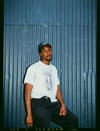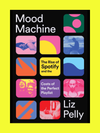A Fireside Chat With Nourished by Time
Marcus Brown talks about the making of his amazing new album 'The Passionate Ones,' filming a video at a New Jersey mega-mall, and how he stacks up against flip-happy arena rocker Benson Boone.

No one makes music like Marcus Brown, the acerbic and kindhearted 29-year-old who goes by Nourished by Time. Combining his love for the harmonic ecstasy of ’90s R&B, the shaggy synths of new wave, the rhythmic cadences of rap, and whatever else he happens to be feeling, his new album The Passionate Ones is an elevation of the promise he made on his breakout 2023 debut, Erotic Probiotic 2. His jagged rubdown jams posit that romantic love is inextricable from community, and that we could figure out how to save ourselves in the soar of a gospel vocal. The Passionate Ones is one man’s exegesis of trying to keep his heart clean amid late-capitalist American absurdity, and it can be earnest and funny as surely as it can sound wistful and bright—all of Brown’s complexities as a musician and person are right there in his bubbly synths, arena-worthy guitars, and baritone mewls. It’s easily one of my favorite records of the year.
I first interviewed Brown two years ago, when he was playing opening slots solo and dreaming about the day he could make enough money to bring along a live band on tour. Last week, when we reunited at Rough Trade’s record store in Rockefeller Center for a live Q&A, about a hundred fans listened intently between the stacks—including Carrington Edmonson, Brown’s best friend and bassist in the band he finally was able to gather, with his gear in tow. (They had just finished practice; both now live in New York City.) It was a very “you’ve come a long way, baby” moment. An edited version of our conversation is below.





